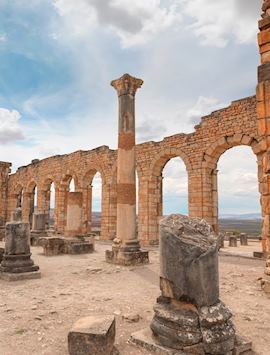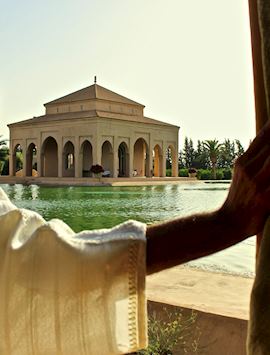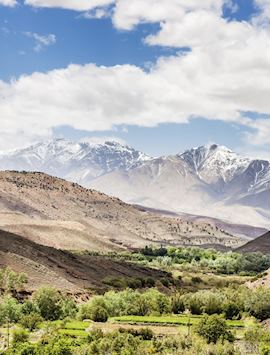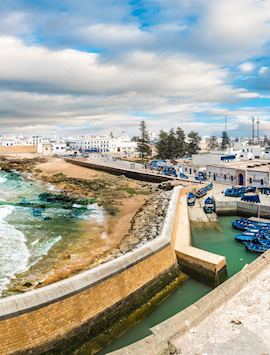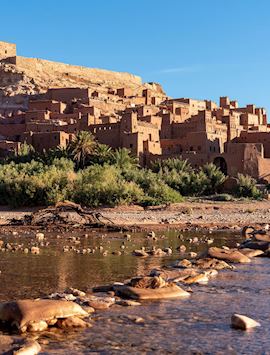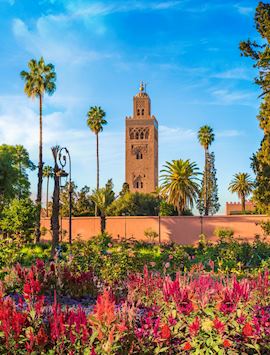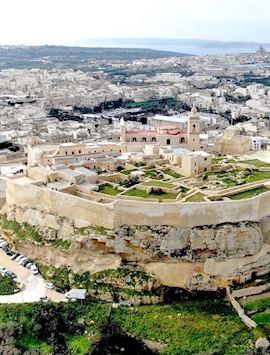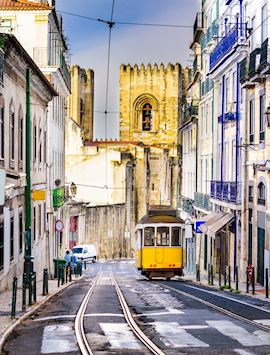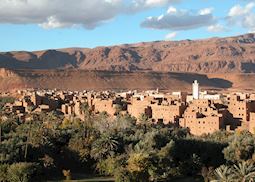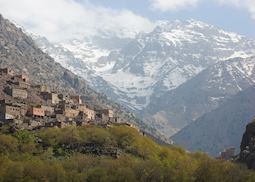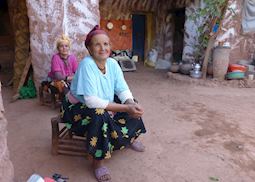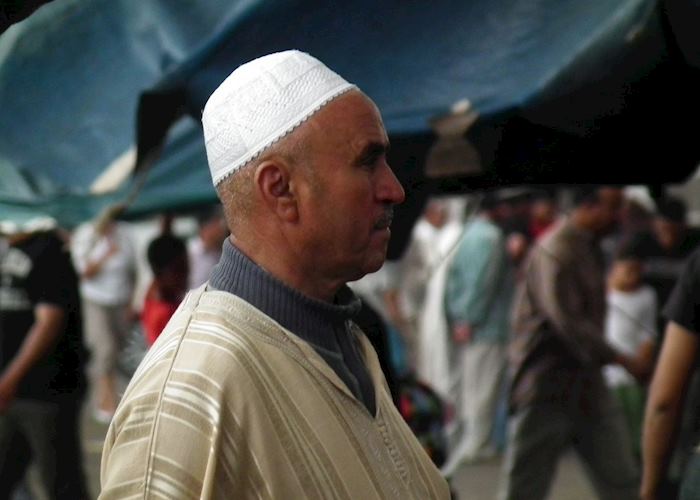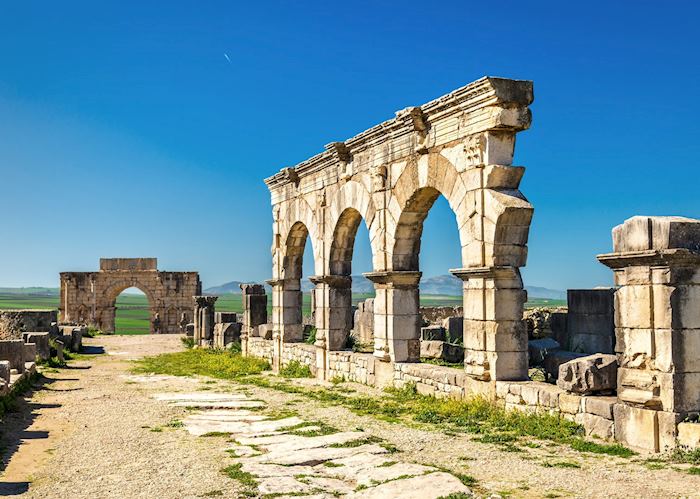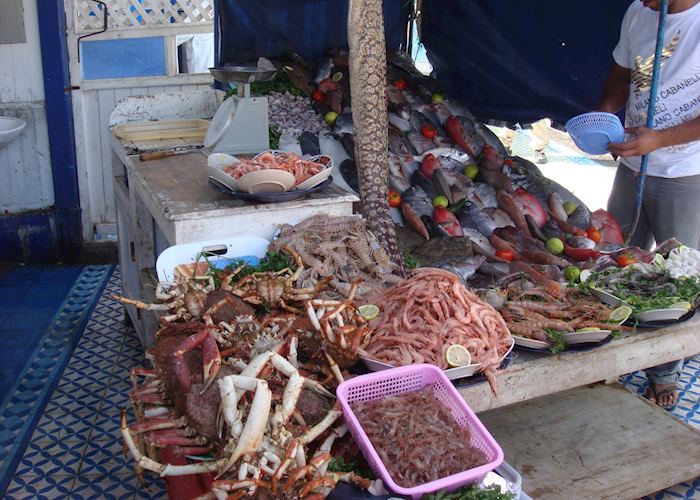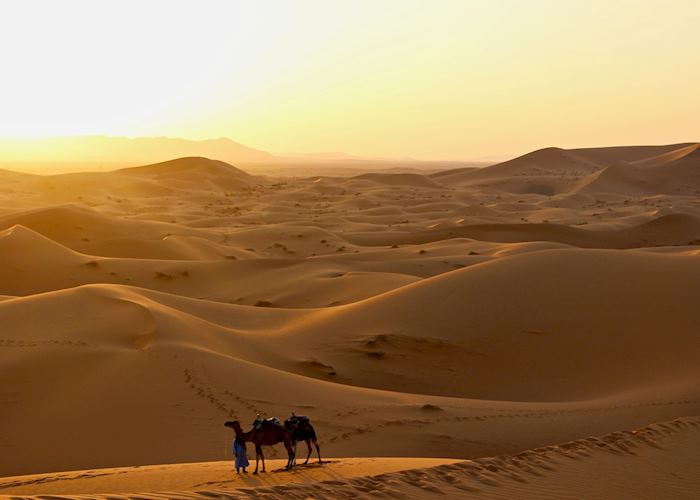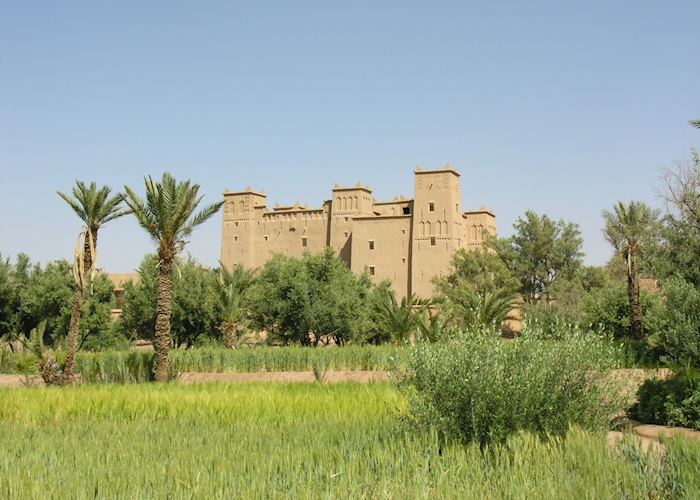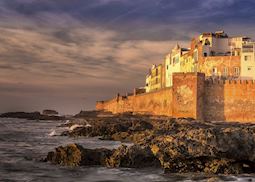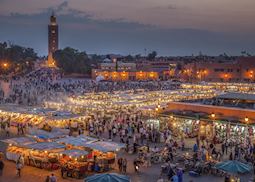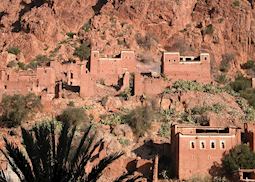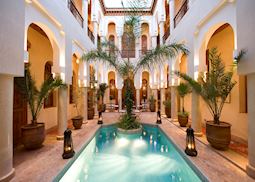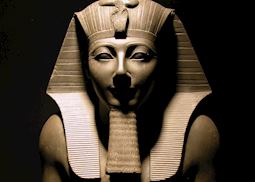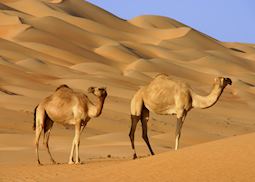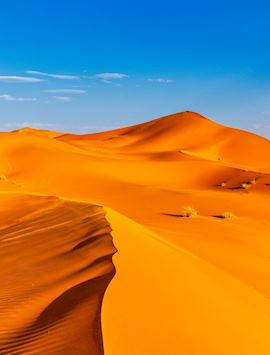
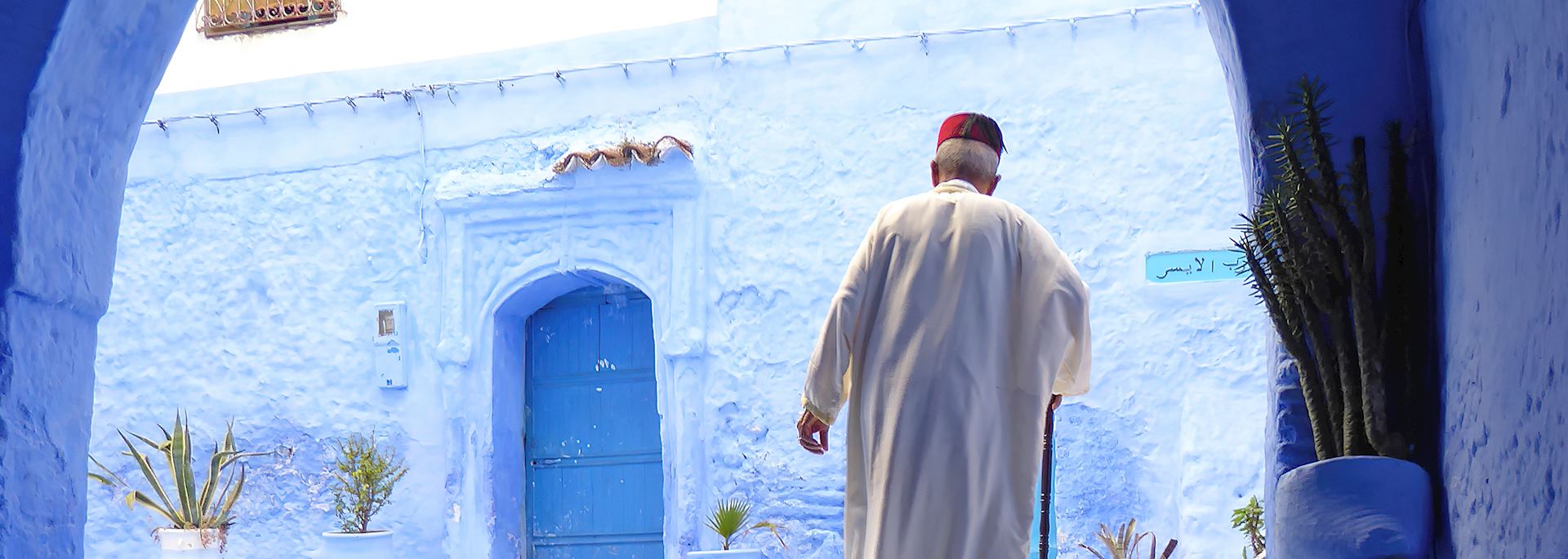
Tailor-made Morocco vacations shaped around your passions
The maze-like souqs of Fez, the vast orange dunes of the Erg Chebbi, nomads in the Sahara… On a tailor-made vacation to Morocco with Audley, you’ll see the highlights — and much more — your way. We’ll design your ideal trip with you, paying close attention to your interests, your travel style and your budget. Our Morocco specialists know the country inside out and can lead you to experiences you won’t find in a guidebook.
Taste Morocco’s spice-scented cuisine at a private cooking lesson in Marrakesh. Bargain for a hand-knotted wool rug while sipping sweet mint tea in a noisy medina. Hike among the ancient villages and winding tracks of the High Atlas Mountains. Unwind in the windy-swept port town of Essaouira. Watch the stars from a tented camp in the deep, echoing silence of the desert.
The fortified kasbah of Aït Benhaddou. Roman ruins at Volubilis. The blue-washed village of Chefchaouen. What excites you? Travel at your own pace, in your own style, with the confidence that we’ll show you the best options, wherever you go.
Suggested tours for Morocco
These tours give you a starting point for what your vacation to Morocco could entail. Treat them as inspiration, as each trip is created uniquely for you.
Suggested activities for Morocco
Whatever your interests, our specialists will build activities into your trip that connect to how you want to experience Morocco.
-
Dades Valley & Gorge tour ![Todra Gorge, Morocco]()
Dades Valley & Gorge tour
OuarzazateDades Valley & Gorge tour
Explore the beautiful Dades Valley, otherwise known as the 'Road of a Thousand Kasbahs'. The red hues of the stark mountain scenery contrast with the softer green of the fertile valley floor, ringed and protected by mud-brick walls and fortresses.
View details -
High Atlas Mountains trek ![The High Atlas Mountains, Morocco]()
High Atlas Mountains trek
The Atlas MountainsHigh Atlas Mountains trek
Arrive in the village of Tassa Ouirgane, situated near the Toubkal National Park at an altitude of 1,200 m. From here starts the hiking through forests of oaks and juniper trees to Azzaden Valley.
View details -
Berber Village & Assafou Foundation Visit Responsible Choice We've hand-selected a range of tours and stays across the world that go above and beyond to be a force for good by supporting local businesses, educating staff, challenging local norms, or promoting conservation and biodiversity efforts. Your Responsible Choice helps increase the positive impact of your trip.![Amazigh hospitality in the High Atlas]()
Berber Village & Assafou Foundation Visit
MarrakeshBerber Village & Assafou Foundation Visit
Head into the High Atlas Mountains to meet and have a traditional lunch with an Amazigh family before visiting the Assafou Foundation, a charity that supports local children, women and older men who want to further their education.
View details
Why travel with Audley?
- 100% tailor-made tours
- Fully protected travel
- Established for over 25 years
- 98% of our clients would recommend us
Best time to visit
Our specialists advise on the best months to visit Morocco, including information about climate, events and festivals.
Request our brochure
Covering all seven continents, The World Your Way shows you how you can see the world with us. It features trip ideas from our specialists alongside hand-picked stays and experiences, and introduces our approach to creating meaningful travel experiences.
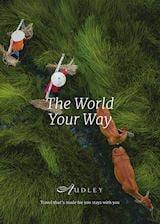
Useful information for planning your vacation in Morocco
Morocco has two official languages, Modern Standard Arabic and Standard Moroccan Tamazight, though you’ll primarily hear people speaking Moroccan Arabic, which is very different from Standard Arabic. It’s so different that the dialect is almost incomprehensible to the rest of the Arab world outside North Africa.
You may also hear people speaking French, and in the rural areas where the Amazigh people live, you’ll hear various dialects of Tamazight. English is becoming more widely spoken in towns and cities, though not so much in more rural areas. However, we’ll pair you with guides who speak good English.
The currency in Morocco is the Moroccan dirham (Dh), which is divided into 100 centimes. Notes come in denominations of Dhs 20, 50, 100, and 200 and coins in 10, 20, and 50 centimes, as well as Dhs 1, 2, 5, and 10.
Moroccan dirham is a closed currency, which means you typically can only obtain it once you’re in the country and you can’t take it back home with you afterwards. There are ATMs in all major towns and airports where you can withdraw currency.
In Morocco, we recommend trying tagine, a sweet and sour stew cooked in an earthenware pot, and couscous, steamed semolina grains topped with roasted chicken, lamb, or steamed vegetables. Moroccan cuisine is often lemony with plenty of fresh herbs and spices, as well as sweet, dried fruits. At the street food markets, you can also try succulent kebabs and babbouche, a rich broth containing slow-cooked snails and spices.
To drink, try atay, a traditional Moroccan mint tea sweetened with sugar and poured into small drinking glasses from a height. You could also sample some of Morocco’s tangy orange juice, squeezed right before your eyes.
Tipping is expected for every service provided in Morocco, no matter how small, so you should leave around a 10% tip in restaurants and a few small coins in cafés. You should also tip guides, drivers, porters, and all other people who have provided a genuine service. We can give you more information on how much to tip each before you travel.
However, some people may request tips even when they haven’t provided a service, such as for giving you information that you didn’t ask for. In this case, you can say no and walk away.
For the latest travel advice for Morocco, including entry requirements, health information, and the safety and security situation, please refer to the Canadian Government Travel & Tourism website.
Morocco is best known for its centuries-old cities and desert stays, but you can also hike among mud-brick ruins in the High Atlas Mountains, spend the day learning traditional crafting techniques in an Amazigh village, taste your way through city street food markets with a local, and so much more.
Our specialists can help craft a trip based around your passions, whether you want to whizz through the narrow streets of Marrakesh on a motorcycle sidecar, take a cookery class with a local family in the old city of Fez, or something else entirely.
Morocco lends itself to characterful stays both in and out of built-up areas, from traditional Moroccan riads in the heart of the city to mud-brick kasbahs nestled in the mountains, as well as luxury tents in the middle of the desert.
You’ll find both simple stays in Morocco and more lavish hotels complete with hammams and private terraces. Our specialists can help you find something to suit your tastes, but in the meantime, take a look at a selection of the hotels we offer in Morocco.
Go to Marrakesh and Fez for intricately adorned souqs tucked down narrow side streets, the Atlas Mountains for rural village culture and hiking trails, Erg Chebbi for a desert retreat, and Essaouira for a fortified coastal town with pre-Roman history.
There are, of course, many other places you can visit in Morocco, and our specialists will help you narrow down destinations so you can explore the country your way.
It takes around 20 hours to fly from either Toronto or Vancouver to Marrakesh, Morocco. We recommend flying with Delta, Air France, KLM, British Airways, American Airlines, and a few other airlines, which we can advise on.
The time zone in Morocco is UTC+1 most of the year, except for during Ramadan when the clocks go back one hour to UTC+0.
The best way to get around Morocco is by private car, or you can travel between some cities by train, such as Fez to Marrakesh, which will be less costly. Domestic flights can be unreliable, so having a private driver is preferable. That said, some of the driving routes can be quite long and bumpy, so we recommend taking anti-sickness tablets with you just in case.
Use our travel tool to find up-to-date visa and passport requirements for Morocco. Enter where you’re traveling to and from (including any stopover destinations en route or flight layovers), along with your intended travel dates and passport details, for a full list of requirements.
You should speak to your doctor about which vaccinations you need for Morocco. You can also take a look at suggested vaccinations for Morocco on the Government of Canada — travel vaccinations website.
Morocco is a predominantly Muslim country, so it’s important to dress fairly modestly to respect local customs. Loose clothing that covers the shoulders and knees is best, and will also help you keep cool in the hot weather. If visiting a mosque or religious site, you should remove your shoes and women may be asked to cover their hair.
You should also bring comfortable shoes and layers, especially if you’re visiting the Atlas Mountains where the trails can be uneven and the weather can reach freezing temperatures.
During the holy month of Ramadan, local Muslims will likely be fasting during daylight hours, and while you don’t need to participate, you should avoid eating, drinking, and smoking in public while others are fasting. Some restaurants and shops may alter their opening hours to help staff members who are fasting and going to the mosque, but you’ll be able to get food at your hotel as normal.
After sunset, the fast is broken with an iftar meal, and celebrations begin. It’s not uncommon to receive an invite to join in, which can make for a special evening immersed in the local culture and festivities.
Never pay the first price that’s given to you at a souq in Morocco because bartering is widespread and encouraged. You should always have a maximum price you’re prepared to pay — we can let you know what’s reasonable for common items before you travel — walk away if it isn’t right. This often leads to significant price reductions, but you’ll likely always pay more for goods than a local person will. Finally, keep negotiations light-hearted and jovial for the best results.
Morocco in pictures
Our expert guides to traveling in Morocco
Written by our specialists from the viewpoint of their own travels, these guides will help you decide on the shape of your own trip to Morocco. Aiming to inspire and inform, we share our recommendations for how to appreciate Morocco at its best.
-
![My travels in Morocco]()
My travels in Morocco
Hike the High Atlas Mountains, browse the souqs of Marrakesh, learn to make a tagine from a local and watch the fishing boats in Essaouira on your tailor-made trip to Morocco.
-
What to do in Morocco: our highlights guide ![Essaouira, Morocco]()
What to do in Morocco: our highlights guide
What to do in Morocco: our highlights guide
Morocco is a destination with fascinating local customs, a rich history and many geological wonders. Immerse yourself in the labyrinth of Medieval souqs, try the local cuisine, go walking in the beautiful High Atlas Mountains, or take a camel trip into the desert and sleep under the stars.
Read this guide -
Luxury Morocco ![Djemaa el Fna]()
Luxury Morocco
Luxury Morocco
Audley specialist Emma suggests the most indulgent ways to enjoy the varied pleasures of Morocco, whether you’re looking for an opulent riad in the heart of the Fez medina or a chance to explore a landscape where few others have trodden.
Read this guide -
Family vacations in Morocco ![Berber village in Ameln Valley, The Anti Atlas, Morocco]()
Family vacations in Morocco
Family vacations in Morocco
A vibrant and diverse country, Morocco is a very family-friendly destination with plenty of hands-on experiences and quirky accommodation options for families. Morocco specialist Kerry explains how to get the most out of your time here.
Read this guide -
Riads and kasbahs of Morocco ![Riad Lydines, Marrakesh]()
Riads and kasbahs of Morocco
Riads and kasbahs of Morocco
A stay in a riad or kasbah offers intimacy, style, character and charm, and is undoubtedly a highlight of any trip to Morocco. Here at Audley we can recommend traditional accommodations to suit your preferences.
Read this guide

